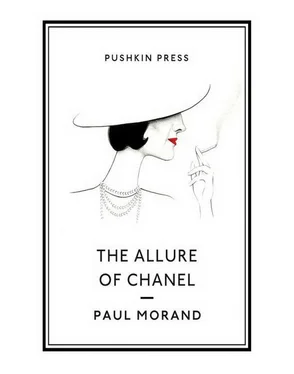On the subject of literature, an American newspaper asked me, some ten years ago, for a monthly column along the lines of: “What Mlle C thinks about …” I started writing a few articles; it soon bored me. So I suggested to the editor that he had these pieces done by Princesse Marthe … who writes so prettily that it is almost as if it were Anatole France, from beyond the grave, who was holding Mme Arman’s pen on this occasion. Naturally, in these impressions that I was meant to inspire without writing them, I needed to be there myself. From the first article by the Princess of fairy tales, the author had devoted half the column to praise of herself, another quarter to Paris, the City of Light which was intended to be her projector; the rest she used to expose me. “Paris was pink, the colour of pearl, the day was mild, my motorcar drew up in the rue Cambon and I set foot on the pavement: by chance my gaze fell on a pretty yellow sweater; I walked in, filled with wonder at this over-modest and inventive genius among the smaller couturiers who seems to be able to anticipate the wishes of us ladies …” etc. You see the kind of thing. The Princess did not receive her dollars; it was dishonest work.
I have mainly had foreigners work for me. The French have a great facility for asking favours for themselves, but don’t want to owe anything to anyone else. (I, on the other hand, like to ask on behalf of others.) When I dressed Parisian ladies without invoicing them, they criticised me, so as to show their independence. Eventually, I paid the bills directly. People said to me:
“Why give them all that money?”
I replied:
“So that they can speak ill of me.”
When I took smart friends on a trip, I always paid, because society people become amusing and delightful when they are certain they won’t have to pay for their pleasure. I purchased, in short, their good humour. They are irresistibly dishonest. In Berlin, the duchess (an Italian name here), who came with me, had a superb leather coat delivered to the hotel where we were staying, just as we were about to leave. I was in a bad mood, that morning.
“I refuse to pay for that,” I said.
“Oh! But there’s nothing to pay,” replied her boyfriend (for I had brought along the duchess’s boyfriend too, of course).
“Why is that?”
“We’ll leave without paying. Aurélia didn’t give her name …”
It was, after all, like putting something stolen on my account. I like Aurélia very much; she’s a great courtesan, four centuries behind her time.
Yes, society people amuse me more than the others. They make me laugh. They have wit, tact, a charmingly disloyalty, a well-bred nonchalance, and an arrogance that is very specific, very caustic, always on the alert; they know how to arrive at the right time, and to leave when necessary.
Having said this, I think it appalling that the wealthy Baronne de R or the very elegant Mrs B should have slept with my colleague P (may God help him!) to procure dresses that they could very well afford; this with the full knowledge of their husbands and lovers, naturally. As far as that goes, I’m an anarchist. If it should continue, and get worse, I’d prefer the Bolsheviks. What’s more, a society does not vanish for any mysterious reasons: it crumbles because of little things like that.
Society people have inherited from their forebears a complete ignorance of the most elementary commercial probity; every day is Sunday for them, and everyone is Mr Sunday. As long as they were not involved in business matters, this remained confined to social circles, but nowadays, alas, they are. In the world of couture, I’ve hardly ever noticed them behaving gallantly any more.
My friend, Madame de V, gave a dinner party for our top couturiers at her pretty Paris home, at which we were all to be seated at small tables. It was, in actual fact, this same P who was to be the guest of honour. The dinner was preceded by a cocktail party in the garden. The hostess was insistent, pressing everyone to stay. I went to her table; I could not find my place, even though I was told I was expected. While I was searching, the other tables, at which my colleagues were presiding, had been filled. I then noticed a little side-table, next to a partition, and I sat down on my own. The maître d’hôtel, who was helping out and who often worked for me, was the first to be aware of my isolation.
“Mademoiselle can’t stay there, all alone.”
“I’m fine. Bring me some cold chicken.”
“Here’s some champagne, the real thing, not sparkling wine. For there are two kinds, according to the tables.”
I put on my large spectacles and, with great amusement, I looked about me. Surrounding my colleagues, were those glamorous members of Parisian society whom they had dressed. The party was delightful, but I was only too well aware that terror reigned. My women friends would very much have liked to come to my table, out of courtesy, but they didn’t dare, for fear of being deprived of their next evening dress.
In short, I was deprived of dessert. The following morning, naturally, my hostess of the previous evening telephoned me to say that she had learnt too late about my punishment, that she was my best friend and that I was head and shoulders above everyone else, and a thousand other exquisitely perfidious pleasantries. All this could only be explained by a need to exaggerate, for, unlike the others, not having anything else to refuse P, this former buyer, she had wanted to do even better, so as to please him.
The kings have gone, but the courtesans remain.
I FEEL SORRY FOR THEM. They are poor creatures. They weren’t brought up for this madhouse we live in. They want to vote, smoke, use weapons they know nothing about; they drive lorries; if only they drove them into the ditch! But no, they drive them well, that’s the real disaster. They had their grief, their tears, their revolver from Gastinne Renette’s, fully paid, but they want more. In their pursuit of man, they have not understood that man adores victims (other people’s, of course, not their own).
I feel sorry for women because they always make mistakes. They always bring everything back to themselves. They want to please the passer-by and the passer-by doesn’t know this. They don’t realise that their virtues (especially if these virtues are masculine ones) cause men to flee.
They conceal their defects instead of considering them as yet another asset. You have to know how to take advantage of your flaws and apply them with cunning; if you know how to make use of them, you obtain everything. You have to hide your virtues if you have them, but people should know they exist. The majority of men are dishonest; all women are.
I don’t have friendships with women. Apart from Misia, they never amuse me. They are frivolous, whereas I am thoughtless, but never frivolous. The older I get, the more thoughtless I become. A good-looking woman annoys other women, and she bores men.
A woman = desire + vanity + the need to gossip + a confused mind. Having said this, I adore women’s concern for their appearance. So many men, so many poor girls, so many businesses make a living from it! There are many more people who live off women’s squandering than people who die from it.
Women choose a dress by its colour; were they not to overlook this essential factor, they would be men. It’s all right if they’re customers, but it infuriates me to have to open my showrooms to numbskulls whose job it is to look at a collection, but who don’t know how to see.
When women see a new dress, they lose their minds. One could smudge the model’s white dress … Women copy men, without realising that what improves a man’s appearance, makes they themselves look ugly.
Читать дальше












